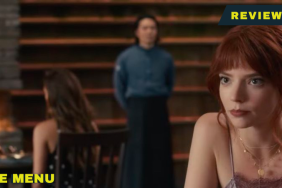
9 out of 10
Cast:
Daniel Day-Lewis as Reynolds Woodcock
Lesley Manville as Cyril
Vicky Krieps as Alma
Sue Clark as Biddy
Joan Brown as Nana
Harriet Leitch as Pippa
Dinah Nicholson as Elsa
Julie Duck as Irma
Maryanne Frost as Winn
Elli Banks as Elli
Amy Cunningham as Mabel
Amber Brabant as Amber
Geneva Corlett as Geneva
Camilla Rutherford as Johanna
Gina McKee as Countess Henrietta Harding
Directed by Paul Thomas Anderson
Phantom Thread Review:
Paul Thomas Anderson’s output of the last decade has been complicated and sometimes disappointing – filled with great skill but not always clear vision. Quite a bit of Phantom Thread is reminiscent of the discursions of The Master or Inherent Vice, but the eye behind it is clear, far-seeing and seldom distracted (even when it seems otherwise). Like any great work, there is too much packed into this documentation of the cruel and complex relationship between a fashion designer and his muse to say anything for certain, but may be a masterpiece.
It’s certainly an object of art just to look at. Anderson and his art crew, particularly production designer Mark Tildesley and costume designer Mark Bridges, have built not so much a recreation of period London as a fantasy world trapped in a bottle. Aging dress designer Reynolds Woodcock (Day-Lewis) has a very set routine he uses to enable his artistic process and has done his best to build an insulating cocoon around himself to preserve it from the food brought to him in the morning to the people he allows in his life – most of it controlled by his long-time business manager and singular constant (Manville).
But something in him rebels, some human part that needs other people and constantly wars with his isolationist half. When it does he drives out to the country, finds some new woman to bring into his life and then does his best to drive her away until he is compelled to do the same in a masochistic tendency which may not be absolutely necessary to the artistic process but certainly is for Woodcock. Though it is suggested he has repeated his pattern many times over the years, Anderson’s primary focus is on the latest and last of them, émigré waitress Alma (Krieps, in a career defining performance) who he abducts from her life and into his.
It would be the easiest thing in the world to reduce Phantom Thread to the level of examining what makes an artist an artist (or to be more on the nose what makes a director a director) and the difficulties of living with such a person. To be fair, there is a tremendous amount of that in it, but it also misses the point. It ultimately doesn’t matter what it is that Reynolds does or how he defines his life and spends his time, his engagements with people would be the same. The thread to follow in Anderson’s work, in all of Anderson’s work, is the complications involved in the simplest thing on earth – two people communicating with one another, especially when the kink is a lack of self-knowledge.
Woodcock desperately wants to make Alma part of his life, and she desperately wants to be part of his, but each only in the way want without compromise for the other. Woodcock wants someone to comfort and protect him in his low moments and stay out of his way in the high ones without needing direction from him. Alma wants him to react to her as more conservative husband should and will not give up on that quest no matter how much abuse he piles on her. The moments when their conflicting desires erupt into understated battle are some of the most exciting and dynamic battles of the year, existing only in the grey area between actors performance and directors eye. Day-Lewis manages more with one dry utterance than all the explosions in a Transformers movie.
But the real joy is in the turn. Anderson has occasionally been interested in melodrama as a way of investigating dramatic choices, but in his later career he’s more interested (and interesting) in the swerves of reality and the way relationships never function the way we expect. No character ever follows the plainly-delineated course their natures would exact in any other film, and yet none ever reads as false. Like There Will Be Blood’s Daniel Plainview, both Woodcock and Alma progressively reveal more sides to themselves, depths to their need, and in that ambiguity Anderson thrives. Does Alma change to suit the needs of the man she has decided is the focal point of her life? Or was she always this way and in finding someone where only her true self did she find the freedom to let that side out?
Phantom Thread isn’t going to tell you, or make the journey easy, but it’s a beautiful trip and examination about the joys and dangers of human connection. It’s a difficult film and no mistake about it, coming close to the edge of the abyss and always backing off keeping catharsis out of reach. But in those difficulties it is alive and sublime, a masterpiece.
Phantom Thread
-
Phantom Thread

-
Phantom Thread

-
Phantom Thread

-
Phantom Thread

-
Phantom Thread

-
Phantom Thread

-
Phantom Thread

-
Phantom Thread

-
Phantom Thread

-
Phantom Thread

-
Phantom Thread

-
Phantom Thread









